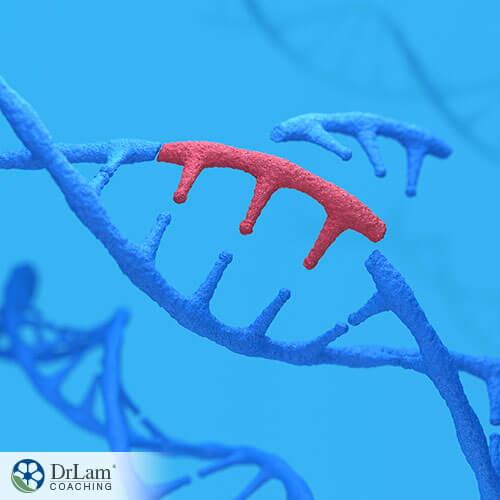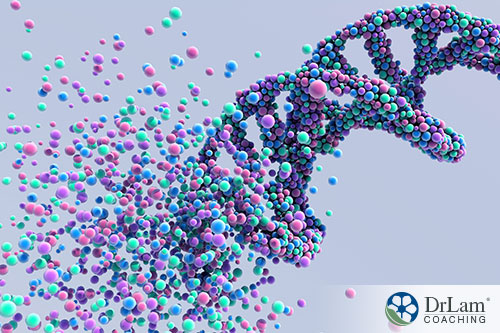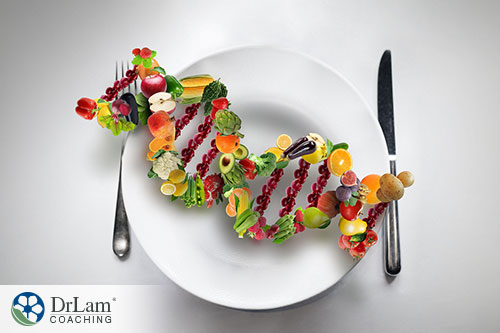 Until recently, it was not possible to understand the human genome and also apply the knowledge in practical ways. We could see how genetics affects health and quality of life, yet we were mostly helpless to do anything about it. Diseases attributed to genetic factors were thought to be out of the control of medical science and the individual’s influence. But with the advent of epigenetics, we now understand that the gene expression is influenced by lifestyle and environment.
Until recently, it was not possible to understand the human genome and also apply the knowledge in practical ways. We could see how genetics affects health and quality of life, yet we were mostly helpless to do anything about it. Diseases attributed to genetic factors were thought to be out of the control of medical science and the individual’s influence. But with the advent of epigenetics, we now understand that the gene expression is influenced by lifestyle and environment.
The human genome is composed of 23 chromosome pairs. There are 22 pairs that are autosomal (i.e. not related to sex) and one pair that contains the X and Y sex-determining chromosomes.
A copy of chromosomes 1-22 from each parent, plus an X chromosome from the mother and an X or Y chromosome from the father, are found in the somatic cells (the non-reproductive cells) of an individual. All human cells (other than red blood cells) contain chromosomes.
Genes are located on chromosomes, and genes contain DNA (deoxyribonucleic acid). DNA is the chemical foundation of heredity, as it determines what you look like and how your body functions.
The DNA molecules are double-helix structures, made up of two long, thin strands that twist around each other and look like a spiral. These two strands consist of sugar and phosphate molecules. However, the rungs that go from one strand to the other consist of nitrogenous bases, are usually referred to as “bases”.
These bases always link together in the same pattern. The adenine and thymine base types are paired together, while cytosine and guanine base types form another pair.
DNA molecules can make copies of themselves and they carry the information your body needs to make proteins. This information is in the form of a code, and the order of the bases along a DNA strand is that code. The length of a DNA molecule that codes for a specific protein is the gene. Humans have between 20,000 and 25,000 genes. So far, these genes account for only 3% of our DNA, while the role of the remaining 97% is not yet understood.
DNA molecules are tightly packed around histones, which are a type of protein. This formation is what we call chromosomes. Chromosome 1, which is the largest human chromosome, has around 8,000 genes, while chromosome 21, the smallest, has around 300. All of your DNA is contained in the nucleus of your cells.
The study of genetics is quite complex. However, based on the understanding of how we inherit our genes, it is logical that we used to think that there wasn’t anything we could do about hereditary diseases. They seemed to be as predetermined as our eye colors and the shapes of our noses. But there is a difference between having a certain gene (or genotype) and expressing that gene (or phenotype).
 A genotype is the inherited genetic makeup of a cell, and this cannot change during an individual’s lifetime. A genotype can only change from one generation to the next, and it happens by chance. A phenotype is a collection of traits (whether physical or biochemical) that results from the interaction of an individual’s genes with his/her environment. A phenotype can change independently of a change in genotype.
A genotype is the inherited genetic makeup of a cell, and this cannot change during an individual’s lifetime. A genotype can only change from one generation to the next, and it happens by chance. A phenotype is a collection of traits (whether physical or biochemical) that results from the interaction of an individual’s genes with his/her environment. A phenotype can change independently of a change in genotype.
Changes to gene expression - whether the gene is active or inactive at a specific time - are possible. But changes to the underlying DNA sequence are not possible. And that’s what epigenetics is all about: understanding how changes in gene expression happen and how we can utilize them for health and wellbeing.
One thing to keep in mind is that epigenetic changes occur all the time. As you interact with your environment and live a certain lifestyle, your genes are adapting. Your genes are always switching various expressions on and off, depending on the immediate need. They keep assessing your environment and then responding accordingly.
For example, in times of high stress, certain systems (such as reproduction) will be slowed down or put on hold. Other systems will be activated and strengthened, like the fight or flight response. Once you’re back to a place of low stress, your system will emphasize reproduction. In contrast, it will lessen its emphasis on survival and longevity.
So it’s not actually about nature or nurture, or genes vs. the environment. It’s all about how they interact together. That intersection can provide a lot of important information on how to optimize health. It’s also the relationship we can manipulate to a certain extent to prevent, or recover from different health conditions.
Epigenetics can be influenced by things like sleep, eating habits, stress levels, age, the presence or absence of disease, toxins, physical activity, the quality of relationships, and socioeconomic status, among others. Epigenetic changes can be as simple as determining whether stem cells are transformed into the skin, liver, lungs, heart, or other cells. Alternately, these changes can be as complex as the manifestation of cancers and other chronic diseases.
So far, three main channels have been identified as the initiators and sustainers of epigenetic changes: DNA methylation, non-coding RNA associated gene silencing, and histone modification. Since epigenetics is still in its infancy, there is still a lot of research being done to understand these channels and other possible sources of epigenetic changes.
But the potential of epigenetics to become one of the most exciting and significant advances in medical science is great. There are over 10,000 peer-reviewed articles published on this topic each year. Currently, there are around 200 active clinical trials.
Unfortunately, people have used epigenetics and the research results to promote pseudoscientific agendas. However, that does not discount the legitimacy of this emerging field in any way.
 Many of the leading causes of death in the US are lifestyle diseases, or they are partially caused by lifestyle factors. They include heart disease, cancer, stroke, Alzheimer’s disease, diabetes, and kidney disease.
Many of the leading causes of death in the US are lifestyle diseases, or they are partially caused by lifestyle factors. They include heart disease, cancer, stroke, Alzheimer’s disease, diabetes, and kidney disease.
Let’s consider how genetics and epigenetics influence the incidence of cancer. There are two possible pathways, the first being that you may or may not have an inherited risk of cancer. The second is that certain changes in the expression of the genes that control cell growth, division and death can drive the disease’s progression.
Cancer is basically the uncontrolled growth of certain cells. All your cells contain a program that tells them when to grow, when to divide, and when to die. But the damage to the DNA that carries the code of this program can increase the risk of developing cancer. Specifically, there are three types of genes that are affected by DNA damage that can lead to cancer. They are tumor suppressor genes, proto-oncogenes, and DNA repair genes.
There’s nothing you can do about inherited predispositions since your DNA sequence/genotype can’t change. But you can still do something about the factors that affect whether or not these genes are active or inactive. You can influence these gene expressions, by keeping the disease genes switched off, and changing the environmental and lifestyle factors that influence them. In other words, just because you have a genetic defect does not necessarily mean that you will have a clinical disease associated with that defect. For example, many have MTHFR genetic defect, but not everyone has the clinical symptoms of methylation issues associated with the defect.
Epigenetics and its associated health programs are founded on an unconventional view of healthcare. They see health as a state of dynamic equilibrium between the internal biological processes and the external environment. Diseases only occur when this balance is disrupted. This model is sometimes referred to as the human system model.
The human system model factors in your biology, behavior, social networks, environment, policy, economics, and culture. The model is adaptive, and it takes into account that you are constantly moving and adapting. This movement is either towards growth and expansion, or towards stagnation and regression.
This is why, for example, people who use a weight loss program at first see a big change. But then after a while, after they have adapted to this program, then they no longer see the same benefits as they did at first. So there must always be some kind of progression as a system adapts.
Environmental and lifestyle factors can be manipulated to keep some genes inactive and enhance others. Similarly, unhealthy environments and lifestyle choices can activate the expression of disease genes and deactivate the expression of good genes. It’s also true that stress can have a dual effect on gene expression.
Did you know that all stress is not bad? Eustress can actually help your body and mind become more resilient, healthier, and fitter. For example, strenuous physical exercise has one of the most stressful impacts on the body. Regular exercise can produce changes in the expression of almost 7,000 genes. Since you have 20,000 to 25,000 genes, that means it affects 28-32% of your genes. But, regular exercise is a significant step that you can take to improve your physical and mental wellbeing.
Chronic stress, on the other hand, is different. Too much cortisol in the body - which happens at the inception of Adrenal Fatigue Syndrome (AFS) - can affect your epigenetics. Cortisol can adjust the chemical tags on your DNA, and these adjustments may increase your risk for future physical and psychological issues. These changes may even be hereditary.
Studies indicate that chronic psychiatric issues may cause specific DNA methylation changes. These changes were connected to genes that affect brain development and plasticity as well as cortisol sensitivity.
AFS is the condition that results when your adrenal glands work overtime to produce cortisol to deal with the constant stress in your body. After a while, the adrenals become exhausted and can no longer produce the cortisol needed. This marks the more advanced stages of adrenal fatigue.
Both physical and psychological stressors can cause AFS. However, physical stressors - like an unhealthy diet, exposure to toxins, taking certain medications, a sedentary lifestyle, the presence of chronic disorders, and recurring infections - seem to have a bigger impact. This impact appears to outweigh the psychological stressors on the adrenal glands and the NeuroEndoMetabolic (NEM) Stress Response. The NEM stress response is the body’s global response to stress.
It is clear that while many of these physical stressors contribute to epigenetic changes, they are also manageable. This is good news, as this knowledge can give you the motivation to take your health into your own hands.
 The most significant factor that influences your health is what, and how you eat. With adrenal fatigue and the dysregulation of the NEM, a good diet is the cornerstone of the recovery process. If you consider the leading causes of death in the USA, you’ll see that many of them are deeply affected by diet.
The most significant factor that influences your health is what, and how you eat. With adrenal fatigue and the dysregulation of the NEM, a good diet is the cornerstone of the recovery process. If you consider the leading causes of death in the USA, you’ll see that many of them are deeply affected by diet.
But food doesn’t just have an effect on how your body’s functions. There is an actual connection between what and how you eat. Your diet can affect the chemical marks that attach or remove from your DNA, which also works to turn genes on or off. This is the central focus of a developing field within epigenetics called nutriepigenomics.
Epigenetic testing can help determine the right type of diet for your genes. This can help prevent the activation of genes you inherited that predispose you to certain health conditions. This testing may also help you switch on genes that support your system in maintaining health and immunity. However, there are proven dietary changes that may positively influence epigenetics and your overall health.
For example, in the adrenal fatigue diet, we emphasize a diet rich in fresh fruits and vegetables, low glycemic index fruits and low potassium fruits, and lean protein such as wild-caught fish and beans. This diet also contains whole grains rather than simple carbohydrates, healthy fats from nuts and seeds, and gut-healthy fermented foods such as sauerkraut and kimchi.
But it’s not just about what foods you eat, it’s also about what you eliminate. One of the biggest culprits in chronic conditions, including AFS and the dysregulation of the NEM, is chronic inflammation. This chronic inflammation usually originates in the gut. One of the major causes of chronic inflammation is the ingestion of inflammatory foods and drinks such as gluten, dairy, sugar, alcohol, sodas, and foods that contain toxins.
Finally, it’s also about how you eat. In the case of adrenal fatigue, we recommend eating every three to four hours max. With other chronic conditions, fasting has been shown to have a powerful effect. Fasting is like hitting a refresh button on the immune system and it also triggers positive epigenetic processes.
Certain foods and nutrients have an especially beneficial effect on epigenetics. For example, omega-3 fatty acids reduce inflammatory proteins while simultaneously increasing lipid metabolism. The oleuropein in olive oil has an effect on inflammation, oxidative stress, as well as bacteria and viruses in the body. The consumption of plant flavonoids is also connected to changes in DNA methylation.
While the field of epigenetics is still developing, it shows a lot of promise. The methods that influence epigenetic changes are similar to those that have been advocated by holistic health practitioners since ancient times. These methods include healthy eating, reducing stress, exercising, sleeping well, and reducing your exposure to pollutants and toxins.
© Copyright 2020 Michael Lam, M.D. All Rights Reserved.
The study of epigenetics explains how genes express (whether they are activated or deactivated) through lifestyle and environmental factors. This means that some genes can be switched off by changing your lifestyle. This helps to lower your risk of developing a health condition.
